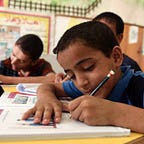Reading and rebuilding: Mosul University Library
Mosul University’s Central Library — once a cultural icon — was ravaged by ISIL. But that hasn’t stopped students continuing their love for reading.
When ISIL controlled Mosul, people were denied access to books that did not align with Islamic State’s ideology. Creativity was stunted. Students stopped learning and libraries were empty. But many people took the risks and continued to read at home — books were too important to be left completely ignored.
Before its destruction, Mosul University’s Central Library was a cultural icon. It was a hive of activity and housed close to one million resources. During ISIL, it was bombarded by missiles and badly burnt. Rubble and debris littered every floor.
Enter UNDP rubble-removal crews, who, in a period of a few weeks cleared the debris, setting the building up for infrastructure rehabilitation. The crew was made of about 150 workers — all of them locals from Mosul, and many of them females or students from the university with fond memories of studying in that very library.
The arduous task of restocking books has begun. Universities around the world have donated thousands of books to Mosul’s Central Library which are currently being indexed and made available to students.
Today, UNDP is working in partnership with the Government of Iraq work to rehabilitate the Central Library’s structure, students are taking advantage of the temporary pop-up libraries around the university to continue reading and learning.
Adan, 23
Studies Sports and Physical Education at Mosul University’s Educational College for Girls.
“As a Sports and Physical education student, I like reading books about basketball. And when I’m on university holidays, I make sure I read for two hours every day. Mainly poetry, novels and fantasy.”
Ali, 27
Library management student in the Department of Library and information science, College of Arts, Mosul Uni
“The library is important because it’s a source of information. It increases culture. Through reading, people know more information about their lives. Those who read more, understand more.”
Sara , 22
Biology student, Educational College for Girls, Mosul University
“I use the library to develop myself as a person, and I really enjoy reading. I started reading books at 10 years old”
Nadim, 26
Engineering student, Department of Communication, Mosul University
“I uses the library twice per week. I like is because it’s a quiet place to read and study.”
The central library is being rehabilitated by UNDP and financed by Germany’s Ministry for Economic Cooperation through KfW. Photos: UNDP Iraq/Vincent Haiges
About UNDP’s stabilization work
At the request of the Government of Iraq, UNDP established the Funding Facility for Stabilization (FFS) in June 2015 to facilitate the return of displaced Iraqis, lay the groundwork for reconstruction and recovery, and safeguard against the resurgence of violence and extremism.
FFS currently has more than 3,000 stabilization projects in the 31 liberated towns and districts that UNDP has been asked to work, helping local authorities to quickly rehabilitate essential infrastructure and services.
